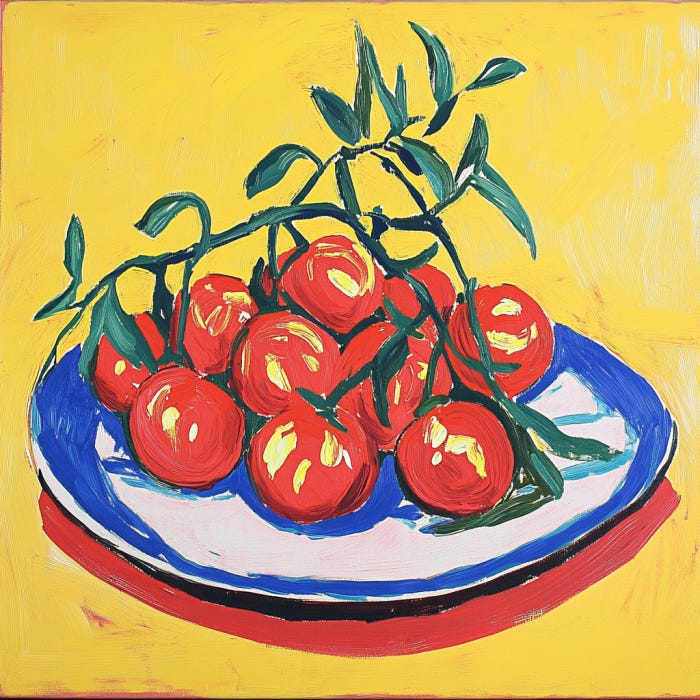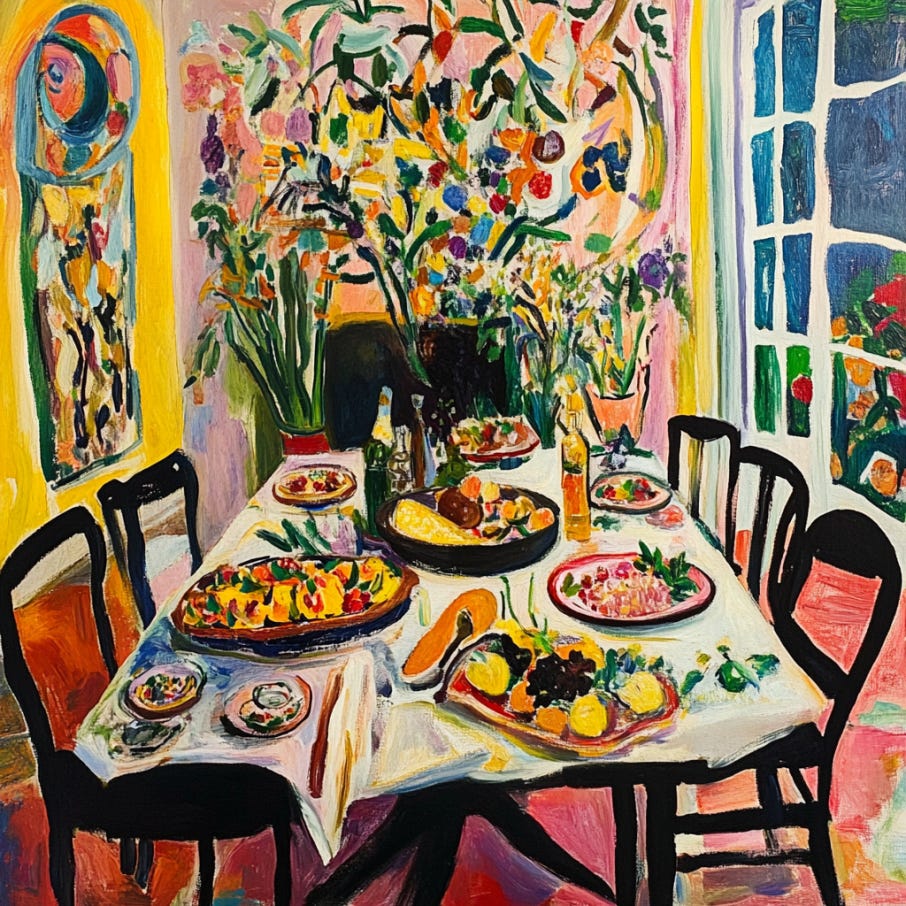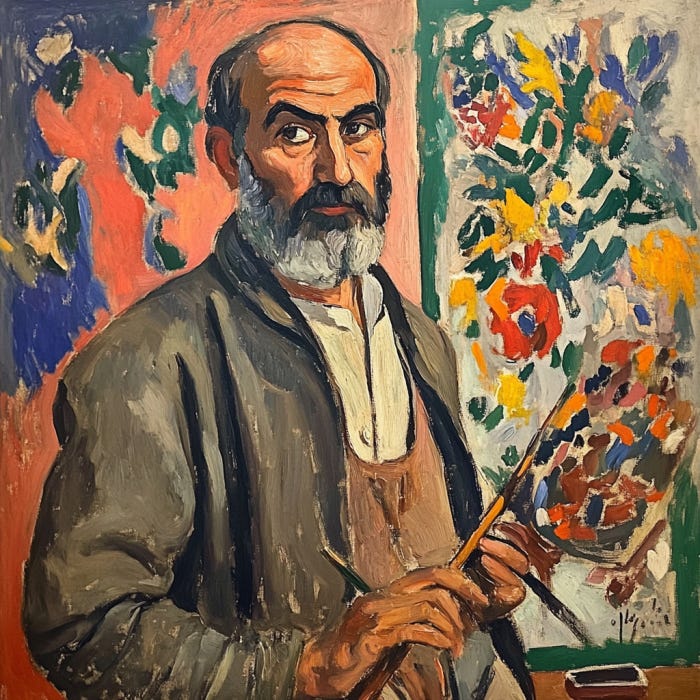Gentle Reader,
There are tens of thousands of tomato varieties out in the world. How did we decide which ones make it to the supermarket?
If you had to guess, you would probably say that over the years, the tomatoes which people recognised to be the most delicious, the most juicy, even the most aesthetically appealing, would be the ones which would be the most popular, and so would end up selling the most and taking up space on supermarket shelves.
You would be wrong. The tomatoes which end up in our shopping baskets are the ones which were easiest to mass produce and mass-harvest, which are the ones best-adapted to fit into the harvester machine.
Flo Crivello calls this the tough tomato principle:
“We make tools so they accommodate the world; until the world remolds itself so it accommodates our tools."
“Tools shape the world until the world reshapes itself to fit the tools. The tomatoes we consume today aren’t chosen for their flavor or beauty—they’re chosen because they fit harvesting machines.”
Flo goes on about how this principle dictated much of modern marketing and advertising. For example, at one time you might go to the bar which was the most fun or which was the nearest to your house, whereas now you might be the most likely to go to a bar which has good lighting for Instagram or appealing looking drinks which are photo friendly. In this way, the tool we use in our daily lives dictates the inputs in our lives.
It’s certainly interesting, and it’s a reminder of how counterintuitive the Economics of Supply are, just like the Economics of…just about everything. As a slightly head-melting principle, it’s not an isolated case.
Behind the principle of the tough tomato, I believe there is a broader concept at play, something which, inspired by Flo’s gutsy coinage, I will call ‘The Anodyne Effect.’
The Anodyne Effect
Reflect on those mass-produced tomatoes. They got where they are because they met all the criteria, without necessarily excelling at any particular one. They are generalists – they taste okay, their colour is fine, they can be harvested easily, they are disease-resistant, and so on.
Another variety which tasted amazing, had a beautiful colour, was disease resistant…but could not make it into the harvesting machines, would be destined for failure.
The principle at play is this anodyne effect, which prioritises the ability of a product to be broadly inoffensive over its ability to delight.
This effect can be conceptualised by imagining you are hosting a dinner party scenario with one hundred guests. Ninety of them are omnivore, nine are vegetarian, and one is vegan.
On the face of it, it would seem logical to provide a mixture of meal options. However, your caterer informs you that for simplicity, only one meal type can be provided and, since the only meal acceptable to all one hundred guests will be the vegan meal, that’s what you’ll get.
In this instance, we see a kind of ‘minority veto’ meeting the path of least resistance, or an example where ‘toughness’, here described as acceptability or unlikeliness to offend, dictates dinner choice. Even with only one vegan, that one person will get their preference, while ninety nine will get a meal which is acceptable to them but may not be preferential.
The minority rules – the vegan meal is the tough tomato of the dinner party world.
Become very good, and they still might ignore you
In medical school, we learned the principle of: Primum, non nocere (first, do no harm.) The anodyne effect is the principle of: Primum, ne offendas, which means: first, do not offend.
This effect is evidenced in our choices of media such as books and films. The film industry, for example, prefers to stick with a tried and trusted formula (e.g., Gladiator II), which is likely to be palatable to millions, even if extremely stimulating or rewarding to very few. This stands in contrast to arthouse or indie cinema, which serves to delight the few, and abhor the multitude.
Such processes are neither good nor bad; they simply are, but they attract commentary and culture wars. Realising and accepting that human behaviour is governed by somewhat bizarre and arbitrary principles might not be the most heartening thing in the world, but it’s a useful and serviceable lens for observing the world, and one that made me question my prior beliefs.
Cal Newport wrote a book called ‘Become so Good They Can’t Ignore You: Why Skills Trump Passion in the Quest for Work You Love.’
It was very good, and impressed the present writer deeply. Newport argues that if you get extremely good at something, pouring your heart and soul into it, you will eventually become successful at it.
The cynic in me sees that the anodyne effect can still triumph, however, over talent and hard work, due to the nature of certain markets. There are many craftsmen and craftswomen in the world who are so devoted to their craft that they have never even considered it a choice or a decision, it simply is how they live.
If these craftspeople were tomatoes, they would not fit in the harvester, and if they did, they might not prove palatable to those who teem the aisles of supermarket chains. Such tomatoes contravene the law of the anodyne effect: to become widely distributed, you must remain palatable, whilst meeting all the requirements of production, harvest, and consumption.
But many of these people work in obscure fields or have obscure tastes or produce output which quite simply will never be palatable to the vast majority of people. These workers become very good, but may still be ignored due to the fundamental nature of their life’s work, and we may be right in saying that some become very good, and still get ignored or minimally rewarded – the market is cruel.
Tough and tasty
While the anodyne effect may be widespread, there are artisans who are immune to its treacherous influence.
One of them is Tom Grundy, a friend of mine who is a master of simple mindset shifts which can have huge positive downstream consequences.
Tom is one of the toughest tomatoes out there – you’ve got to be tough to write a newsletter every single day. But unlike the tough tomatoes which are splashed across the aisles of grocery stores, Tom’s work retains the individual character, and ability to delight, of a delicious heirloom variety.
Reading his work, I’ve lost count of how many times I’ve had a ‘the penny has dropped’ revelation.
If you’d like to check him out, you can read his fascinating article here about his experience of leaving his job, before returning to it again with an entirely new outlook.
Thanks for reading. Subscribe below to get my writing straight into your inbox.
Affiliates:
My friend Paul Millerd runs the Pathless Path Community, a cozy online space where we support each other to find ways to live and work in the most authentic way possible.
I also recommend the Supernote e-ink device, which I use for reading, writing, and annotating documents. This affiliate link is only valid for EU customers.







interesting essay Edwards ! Might look into that book by Newport, did you like it?
To be fair to Newport, he doesn't just say to get really good, he says to get good at something rare and valuable to the market and then you will be successful